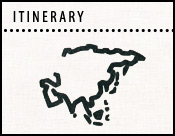An Adventure Capitalist’s Notes on Indonesia (Part II)
Indonesia’s middle class youth prefers the Blackberry as their mobile device, and I’ve never seen its penetration beat out the iPhone more than here.  Every email we get from newly introduced friends seem to include something like “Sent from my BlackBerry® smartphone from Sinyal Bagus XL, Nyambung Teruuusss…!” in the footer.  Of course Facebook integration is extremely important (one might say the killer app.) for these users, but Facebook on the iPhone is even more robust.
I confess, I am a Blackberry user myself on AsiaWheeling. Â The physical keypad makes typing quick and deliberate, and the speed of the OS means no waiting around for bells and whistles. Â But why does the Blackberry succeed when the iPhone has better haptic interaction, visual sensuality, and application extensibility? Â The Blackberry, first used by executives and bankers on Wall Street and in London, broadcast to onlookers that “I’m important, I’m connected to money, and people need to reach me to get their jobs done.”
Extending to fashonistas, tastemakers, and socialites, these Blackberries became a symbol of the snobbish cool yearned for by age groups as young as tweens and as old as the newly married. Â This, and the walled garden of Blackberry messenger, which allows only Blackberry users to communicate with each other, creates the ability for RIM to buy their way into groups of friends who are “cool.” Â It is this proximity to the business and social elite that makes the Blackberry a handset of choice over the iPhone, which is more utilitarian than it is social or businesslike.
While skinny jeans, plastic sunglasses, slip-on shoes, and white tank-tops are all relatively cheap and hip clothing, the Blackberry serves as the Accessory to broadcast wealth. Â In developing Asia, where a credit history is rare, but required for a post-paid Internet-enabled phone contract, the Blackberry even serves to say “I have assets, “I have an address”, and “I pay my bills.” Â That stability can go a long way.
To the partygoer, the Blackberry represents social sophistication. Â Ask a recent Ivy League graduate working in investment banking, and she’ll tell you that the Blackberry represents a ball and chain. Â Many would even argue that in the business arena, mobile email makes communication inherently unsophisticated.
Indonesia’s Banking Sector
In Indonesia, Woody and I both find ourselves comparing and contrasting the country to India. Â The differences seem to outweigh the similarities, but it makes for valuable assessment of data points as we move from city to city on Java.
One striking difference is the presence of foreign banks in Indonesia. Â Jakarta’s skyline features prominent HSBC, Standard Chartered, and Deutsche Bank skyscrapers, where Mumbai’s does not. Â Our bureau chief confirmed that regulations governing international banks are less stringent, with lower costs associated for operating permits. Â This no doubt helps fuel the culture of entrepreneurship that is seen in Indonesian and ethnic Chinese Indonesian industry, since credit is more widely available.
We also see in Indonesia corporations financing themselves primarily by these bank loans, as we see in Japan. Â This is unlike the U.S. where financing is dominated first by bond (trade-able debt) issuance, and second by public stock (trade-able equity) issuance. Â This seems to be a more appropriate stepping stone for a developing market, rather than rushing to illiquid bond or equity markets spoiled by abuse of insider information. In India, the Bombay Stock Exchange alone has 4,700 equity names listed, and the National Stock Exchange of India has 1,587, bringing the total to 6,287. Â With only 380 companies listed on the Indonesian Stock Exchange (formerly the Jakarta Stock Exchange), the sleeping tiger of Indonesia has a Nominal GDP per capita of USD $3,600, compared to $1,016 of India. Â Why a penchant for all this more costly and complex public issuance if the country isn’t better off?
While a much more rigorous argument with much deeper supporting data would be needed to do justice to this question, a first glance shows bank financing and private investment a more effective form of financing for medium-sized enterprises than small public share offerings resulting in illiquid markets and small float for those names. Â What are the forces at work here? Â What impetus could be given to Indian CFOs by regulators or markets for better results?
If you’re curious about all the financial regulatory factors that contribute to economic growth and development, pick up a copy of Ross Levine’s book, Rethinking Bank Regulation. Â A lot of people ask me why I’m interested in finance, and part of it is the power of insurance to prevent suicides, bonds to pave roads, and venture capital to enable the use solar energy.


















Comments
Great post, Scott. Love your last line. What’s the drink, coffee?
Are iphones as easy to find and purchase in indonesia as blackberries? I know that here (in Russia), although I have seen a number of iphones, mac products in general have an almost mythical status because they are much more expensive than in the US and not sold very many places. I don’t know anything about Indonesia, but I wonder if the blackberry over iphone preference has as much to do with availablity as choice…
Just got back from Jakarta myself and similarly noted and gasped at the prevalence of Blackberries. Teenagers and CEOs alike use them as their sole mobile phone. For the first time ever, even my clients ask for my Blackberry pin so they can add me on Blackberry Messenger. Our conversation on their varies from what time the car is picking me up to when they will be making the international wire transfer. I thought for a moment about how I could log this conversation in Salesforce.
Indonesians are interesting in the way they adopt technology. My Indonesian friends were always the first on Friendster and Facebook and all those things. And similar to many other Asian countries, small electronic equipment is one achievable way to convey wealth (as opposed to bigger toys like cars and houses.) These factors together make the Blackberry and its exclusive program — the Blackberry Messenger, a must-have for anyone within a certain income.
Delivery service is another key. One main reason we have not seen the Blackberry take over China because the RIM service is not yet available to individuals. The last I heard, it is only available on enterprise servers *and* the service is on roaming from Hong Kong, hence none other than top level business execs would use such a thing.
The way the individual plans are priced is also very important. Living in HK, I would love to have the Blackberry as my only phone but the calling plan is outrageous. Therefore everybody I know has a Blackberry and then also a phone. Lastly, with all friends being in I-Banking where the Messenger program is blocked, BBM — despite how much I love it and prefer it over text messages — never achieves critical mass like it does in Indonesia.
Very happy to see your post! Looking forward to more reports from on the road.
@Helen – The iPhone is definitely harder to get your hands on in Indonesia, but it is available. The price is not outrageous like it is in say, Russia, or Japan, where the carriers don’t subsidize the cost. The Blackberry is definitely more ubiquitous in retail, which I imagine is both a function of demand and Apple’s strategy to focus on markets other than Indonesia.
@Michelle – Good to hear some corroborating evidence from the corporate side of Jakarta. Also interesting to know that banks block BBM in HK. Also shocking that the service is not available for retail customers in China, but even more astounding is that it’s always roaming from HK. Based on personal experience, though, I have seen windows mobile as the platform of choice for chinese smartphones. I wonder what forces are at work here…
Great post Norton. Spot on on the Blackberry.
On raising capital in Indonesia: for a long time banks operated under the vagaries of a dodgy regulatory framework: before 1998, there was no real regulator for the banking sector > no capital adequacy requirements. When the Asian Crisis hit, 20 or so banks folded. With insufficient thought and analysis given to policy, individuals and businesses have always preferred to deposit and loan monies offshore.
And they still do, even though the local banking sector is revamping itself. New laws have been put in place. Up to 99% of foreign ownership is allowed. RBS, Rabo, and HSBC are recent entrants and foreign investor interest is still growing. If multinational banks can bring their expertise in the capital markets, no doubt can we expect more onshore flotations. Islamic Finance is also a growing area eg. CIMB.
Exchange rate volatility, high inflation, and high interest rates are why a liquid bond market never developed. This is true for most emerging market economies. And as far as I’m aware, there is no inflation-linked \ reliable derivative product for hedging risk. From the point of view of the layman – if I can earn 10% pa on a time deposit, why invest in a bond which I don’t really know about. Most issuers continue to tap the international bond market.
Problems with onshore lending\capital market: political risk – Suharto led an anti-Chinese government. Chinese own over 70% of private enterprises in Indonesia. For a long time money was safer parked offshore. Taxes – the taxman can charge whatever he wants. The law – surveillance and enforcement is poor in the securities market and the bankruptcy laws are poorly written. Insider trading is rampant. There is a stock loan system but … Company disclosure and information is unreliable. There’s also no closing or opening auction > lots of market manipulation.
OK, so equity is cheaper than debt and the law is dodgy but why is there still a stock market. Well the top constituents of the JCI are government owned companies. Their borrowing needs are in Rupiah. There is an implied guarantee when buying government paper as theoretically they can print as much money as they want. For SMEs, many still prefer to borrow money or float shares offshore, namely in Singapore.
If only the government and regulator really get their act together to create transparency, there’s no reason why Indonesia’s equity market can develop like India’s. I think it’s just a matter of time.
[…] What’s more, I was not the only who gasped at the prevalence of BBM use. See here for my friend’s analysis on AsiaWheeling. […]
[…] Â Was the role of a small and illiquid equity market on its way to playing the role of its larger Indonesian counterpart? Â We pondered thee thoughts over a small feast of mayonaise […]
Why the Blackberry is more popular in Indonesia is because of its BBM & BBM Group features. As I supposed it was designed primarily for team communication by Blackberry, but when it come to Indonesians, they used them for social communication among social groups. You might wonder to know in a class of secondary school students, almost 95% of them are using Blackberry. This also happens to housewives groups, retired people and other social groups, not to mention the rising middle class youth and professionals.
Indonesians loves to talk and talk and communicate with each others. This was cleverly spotted by telco providers by offering affordable package. My secondary school kid uses a package which only cost Rp 100,000 (eq USD 11) per month. There were also daily and weekly packeges as well. The handhelds for sale in the market were also affordable compared to any other brands.
Post a comment